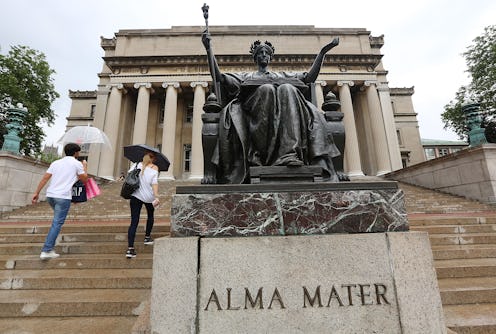Life
UConn Bans Student-Teacher Relationships
The University of Connecticut has officially banned romantic relationships between students and faculty members in their "Policy Against Discrimination, Harassment and Inappropriate Romantic Relationships." Bold move, UConn.
This new rule comes about after professor Robert Miller's alleged sexual misconduct, but administrators said it had been in the works even before his case came to light. The idea behind the ban is that it will foster an “environment free from all forms of discrimination and discriminatory harassment." Particularly, the university seems interested in discouraging relationships with an unbalanced power differential, like any faculty member-student relationship would be.
The Hartford Courant reports that UConn is defining romantic relationships fairly broadly, quoting Associate Vice President Elizabeth Conklin:
"Romantic is a term of art under the policy — but it is any sexual, intimate, amorous proposal or encounter. The relationship can be once, it can be short term, it can be long term, it can be a marriage — everything in between," she said. "The intent is to capture it all ... When you see it, you know it.''
Undergraduate relationships with faculty are totally banned, while graduate student-faculty relationships are a no-go only if the faculty member is in a position of power over the graduate student. So, in other words, I guess a chemistry grad student could have a relationship with an English professor, as long as they don't have any kind of professional relationship.
I have some conflicting feelings on this. Although I think it's a step in the right direction in terms of making power differentials more clear in university settings (and protecting students, particular female ones), it also slightly infringes on people's right to have relationships with whomever they want. Don't get me wrong, I'm not at all in favor of like, sport-coated professors hitting on nubile freshman or anything like that, but I'm sure there's exceptions to every rule, especially since the new clause also bans relationships between staff members (if one is in a higher position than the other). When I was in graduate school, I knew more than a few faculty members whose significant others decided to go back to school at the same institution, as well as graduate students who were married to current undergraduates and that type of thing. Apparently, there will be provisions made for preexisting relationships, including a requirement that they be made known to the university within three months of the new rule.
I don't know, maybe I'm being a little too libertarian about this, but it seems like there's the possibility for a lot of grey area in this ruling. I want to emphasize that I'm not trying to downplay the very real problem of sexual harassment and sexism that's basically rampant in academia, but a zero-tolerance policy might make it hard for legitimate couples to pursue their academic work freely. I hope the university will be careful and conscientious when reviewing cases that might be in violation of the rule; I also hope this ban does create a safe, discrimination-free environment at UConn.
What do you think? Is this kind of regulation important to foster a safe university environment or are the restrictions too stringent?
